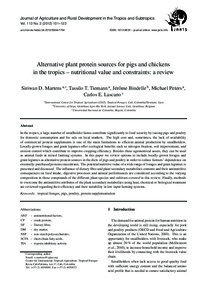| dc.date.accessioned | 2013-03-05T13:09:44Z | |
| dc.date.available | 2013-03-05T13:09:44Z | |
| dc.date.issued | 2012 | |
| dc.identifier.issn | 1612-9830 | |
| dc.identifier.uri | urn:nbn:de:hebis:34-2012092441794 | |
| dc.identifier.uri | http://hdl.handle.net/123456789/2012092441794 | |
| dc.language.iso | eng | |
| dc.publisher | Kassel University Press | ger |
| dc.rights | Urheberrechtlich geschützt | |
| dc.rights.uri | https://rightsstatements.org/page/InC/1.0/ | |
| dc.subject | tropical forages | eng |
| dc.subject | pigs | eng |
| dc.subject | poultry | eng |
| dc.subject | protein supplementation | eng |
| dc.subject.ddc | 630 | |
| dc.title | Alternative plant protein sources for pigs and chickens in the tropics – nutritional value and constraints: a review | eng |
| dc.type | Aufsatz | |
| dcterms.abstract | In the tropics, a large number of smallholder farms contribute significantly to food security by raising pigs and poultry for domestic consumption and for sale on local markets. The high cost and, sometimes, the lack of availability of commercial protein supplements is one of the main limitations to efficient animal production by smallholders. Locally-grown forages and grain legumes offer ecological benefits such as nitrogen fixation, soil improvement, and erosion control which contribute to improve cropping efficiency. Besides these agronomical assets, they can be used as animal feeds in mixed farming systems. In this paper we review options to include locally-grown forages and grain legumes as alternative protein sources in the diets of pigs and poultry in order to reduce farmers’ dependence on externally-purchased protein concentrates. The potential nutritive value of a wide range of forages and grain legumes is presented and discussed. The influence of dietary fibre and plant secondary metabolites contents and their antinutritive consequences on feed intake, digestive processes and animal performances are considered according to the varying composition in those compounds of the different plant species and cultivars covered in this review. Finally, methods to overcome the antinutritive attributes of the plant secondary metabolites using heat, chemical or biological treatment are reviewed regarding their efficiency and their suitability in low input farming systems. | eng |
| dcterms.accessRights | open access | |
| dcterms.bibliographicCitation | In: Journal of Agriculture and Rural Development in the Tropics and Subtropics. Kassel : Kassel University Press. - Vol. 113, No. 2 (2012), S. 101-123 | |
| dcterms.creator | Martens, Siriwan D. | |
| dcterms.creator | Tiemann, Tassilo T. | |
| dcterms.creator | Bindelle, Jérôme | |
| dcterms.creator | Peters, Michael | |
| dcterms.creator | Lascano, Carlos E. | |
| dc.description.everything | Gedruckte Ausg. im Verlag Kassel Univ. Press (www.upress.uni-kassel.de) erschienen. | ger |

